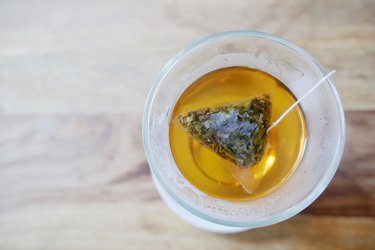
Green tea, like water, is safe to drink daily. However, consuming too much green tea vs water hydration may lead to certain health complications. Proper hydration is vital, and while green tea can make up part of your daily fluid intake, it should not be the only beverage you drink each day.
Tip
When considering green tea vs water hydration, keep in mind your overall daily fluid intake. Green tea can be beneficial, but water should be your primary beverage for proper hydration.
Video of the Day
Consider Daily Hydration
According to the U.S. National Library of Medicine, there is no daily recommended amount of water required, although the general recommendation is for six to eight glasses of water — measuring 8-ounces — per day.
Video of the Day
If you live in a hot, humid environment or engage in strenuous physical activity, you may require more water. All systems, cells and organs in our body require water to function. Water is consumed through foods and drink, including coffee, teas, sodas and juices.
However, some beverages may contain caffeine, which is a natural diuretic, causing your body to release water. The best source of water is simply to drink water.
Understand Green Tea Health Benefits
While it contains caffeine, green tea still has a number of health benefits that potentially outweigh its caffeine content. Rich in antioxidants such as flavonoids, green tea can help your body fight damage from free radicals, which can cause cell death.
Green tea has been associated with helping reduce the chances of heart disease, as it might bring down cholesterol and triglyceride levels, as explained by the Linus Pauling Institute.
Some research suggests that green tea and green tea extract, both rich in catechins, might increase your metabolism and increase fat burning, according to a March 2013 article published by Advances in Nutrition.
Be Aware of Caffeine Content
The FDA recommends that you do not drink more than four to five cups of caffeinated beverages per day — about 400 milligrams of caffeine, as it could lead to negative side effects related to caffeine. For example, consuming about 1,200 milligrams of caffeine in a short period of time can lead to toxic effects such as seizures.
If caffeine consumption concerns you or you are worried about getting a "green tea headache," consume caffeine-free green tea or caffeine-free green tea extracts.
Read more: How Much Green Tea Should You Drink Per Day?
Consider Negative Side Effects
If you are taking any stimulant-based drugs, avoid consuming green tea, particularly in large amounts, as the caffeine can dangerously speed up your nervous system. Doing so can make you feel jittery and nervous, and could lead to a fast heart rate and elevated blood pressure.
According to the National Center for Complementary and Integrative Health, consuming too much green tea can cause negative side effects. Green tea can interact with certain medications, such as beta-blockers — commonly prescribed for high blood pressure and other cardiac conditions.
Too much green tea can also lead to liver problems. Symptoms can include dark urine, yellowing of your skin or the whites of your eyes and abdominal pain. Be sure to talk to your doctor about your intake of green tea.
- U.S. National Library of Medicine: "Water In Diet"
- Advances in Nutrition: "The Effect of Green Tea Extract on Fat Oxidation at Rest and during Exercise: Evidence of Efficacy and Proposed Mechanisms"
- FDA: "Spilling the Beans: How Much Caffeine is Too Much?"
- Linus Pauling Institute: "Tea"
- National Center for Complementary and Integrative Health: "Green Tea"